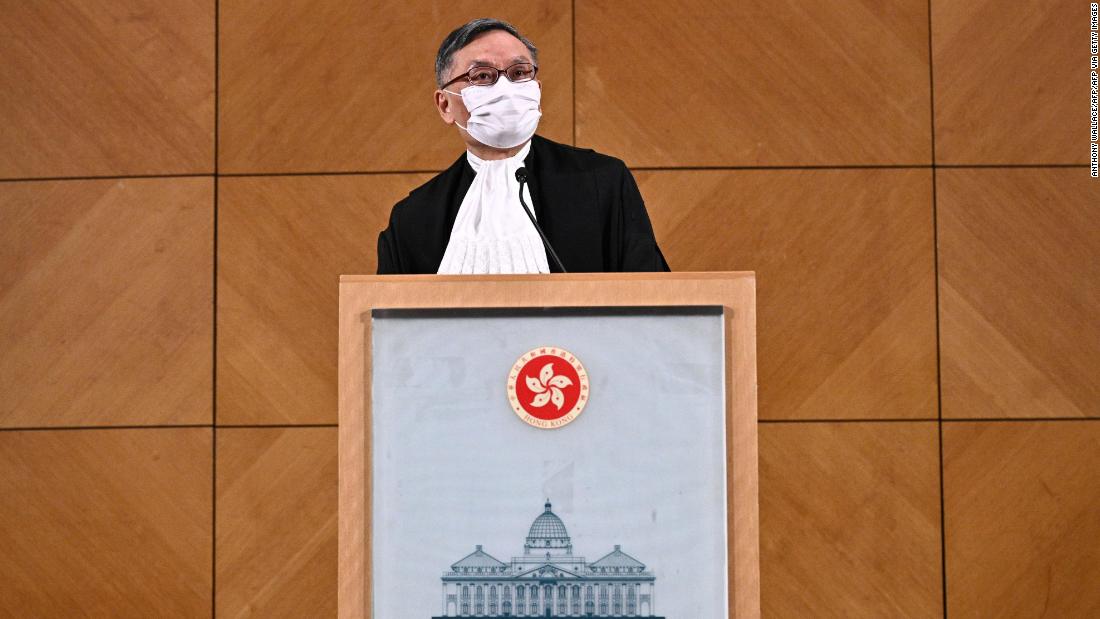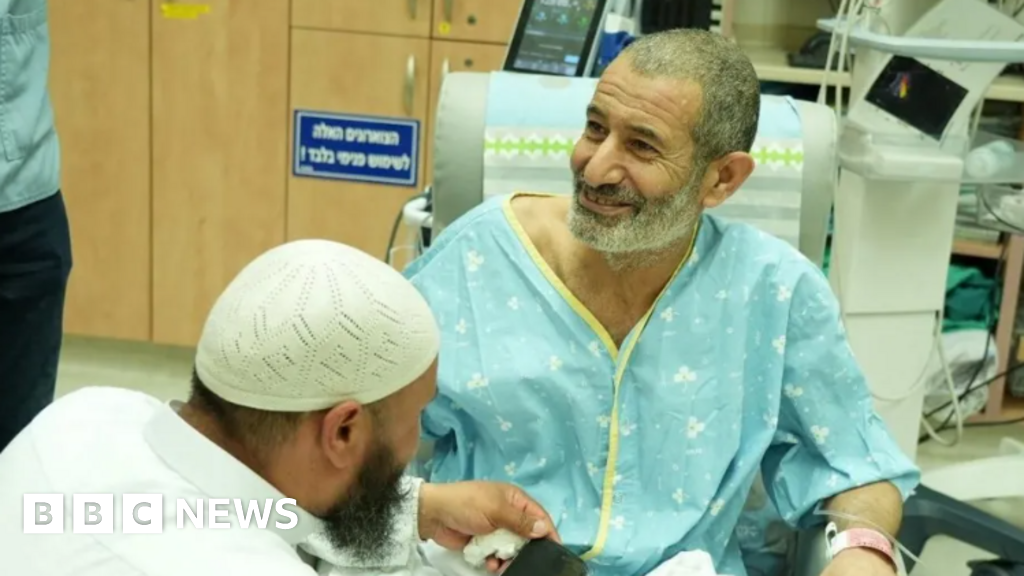Sitting at the city’s final appeals court, Chief Justice Andrew Cheung, wore a black robe, white ruffled collar and white face mask, acknowledged the weirdness of the circumstances as he addressed a small audience of judicial officials and others who watched the Internet.
„The COVID-19 pandemic has caused huge losses everywhere,“ said Cheung. The judiciary and its operations have also been affected, and we must thank our judiciary employees who have worked hard in such difficult circumstances to keep the courts working. “
This law criminalizes acts of secession, sabotage, terrorism, and complicity with foreign forces, and is punishable by life imprisonment.
Such vague standards have provided the authorities with broad powers to suppress opponents of the government as Beijing continues to tighten its control over the allegedly semi-autonomous city. Hong Kong officials had previously promised that the law would in fact be limited, targeting only a small number of marginalized activists. However, critics claim that since its introduction, the law has been used to forcefully wipe out the once vibrant pro-democracy movement in the city.
With both the legislature and administration in the same direction with Beijing, the courts are the only branch of government that maintains a certain degree of independence – but it can be severely tested by the blunt tool of security law.
In his speech, and at a press conference afterward, Cheung avoided discussing the details of the law, arguing that doing so was inappropriate, given that it would soon be discussed in court. But he’s back to one major point over and over again.
„My mission is to do my best to support the independence and impartiality of the judiciary in Hong Kong,“ Cheung told reporters. „This is my mission, and I will do my best to fulfill this mission.“
Such independence could be painfully tested in the coming year, and if it loses, it could have enormous costs for the legal system and fundamental freedoms in Hong Kong. In a speech after Cheung, Philip Dykes, president of the city’s bar association, noted that „without judicial independence, an expensive pearl, we might pack our bags and steal them away, because Hong Kong is nothing without it.“
Law rules
When Hong Kong was handed over to the People’s Republic of China in 1997, the city’s new rulers, who took care not to disrupt their economic dynamism, took care to rave about the importance of the rule of law and independent judiciary to Hong Kong’s continued success. Under the principle known as „one country, two systems“.
Hong Kong’s legal system hasn’t always had the excellent reputation it has now. When the British established their colony in the newly captured region in 1842, they gave little thought to how the new Chinese crown subjects would get to justice.
„In colonial Hong Kong, racial intolerance and prejudice increased the social injustice rooted in the strong class divide in Victorian Britain, and this was reflected in the work of the courts,“ Steve Tsang wrote in his book Modern Hong Kong History: 1841. -1997. The language of the courts was English, and interpreters were rarely provided – meaning that many of the Chinese defendants were unaware of what was happening because they were trapped by an unfamiliar legal system and unsympathetic judges.
However, Tsang notes that even in the early years, when discrimination was rampant, „the rule of law defined the structure and procedures of the legal system, restricted some governors from pursuing certain policies that were harmful to the local community and helped secure the acquittal of many unjustly accused.“
After 1997, the rule of law also helped limit the city’s new governors. Thanks to the strong protection of speech and assembly, Hong Kong has maintained a vibrant political and media scene unlike anything seen in China, with annual demonstrations – such as the June 4 anniversary of the Tiananmen Square massacre – a symbol of these freedoms.
But the conflict between the state and the two systems it contains has grown over time, reaching a breaking point in recent years.
The prospect of submitting to Chinese justice, through the extradition bill with the mainland, sparked the anti-government unrest that shook Hong Kong in 2019. However, while the protests succeeded in defeating the proposed legislation, they also ultimately prompted the imposition of the National Public Security Act. The past, which has created a number of political crimes and undermines the protections in the Basic Law, Hong Kong’s de facto constitution, while creating the possibility for defendants to be transferred to China for trial in some circumstances.
„We must defend the rule of law in the city, but we must also protect the national constitutional order,“ Zhang said, adding that many „problems“ have been revealed in the Basic Law that need to be addressed.
Judicial back guard
In his comments this week, Cheung, the new chief justice of the Supreme Court, appeared to have addressed these differences, indicating that in some cases, the justices have been subject to „intense scrutiny“ and have been „subjected to partisan criticism.“
„While freedom of expression for everyone in society should be fully respected, there should be no attempt to exert improper pressure on judges in the performance of their judicial functions,“ said Cheung. „Judges should be courageous and be prepared to make decisions according to the law, regardless of whether the results are popular or unpopular, or whether the results make themselves popular or unpopular.“
But what exactly the law means may be a moving target as Beijing takes a more pragmatic approach to Hong Kong’s legal system.
Under the Basic Law, while Hong Kong has a „court of final appeal,“ the real ruling of the city’s constitution is the National People’s Congress, the country’s artificial parliament, which can issue “interpretations” of various articles of the Basic Law. Fast rewriting.
In the past, this power was rarely used, but it has been more and more practiced in recent years. Observers have expressed concern that if Hong Kong courts enforce the National Security Act more leniently than Beijing desires, the national government might intervene to force them to do otherwise.
When asked about such interference by the central government, Cheung admitted that Hong Kong judges could do little. „When there is an explanation, the court should follow,“ he said.
In an interview this week, Young noted that “the central and local governments have full confidence in the new chief justice,” which may prevent a barrage of interference in the near future.
He said, „The first batch of (security law) cases that will be submitted to the courts will be seen by everyone as test cases to know the true presentation and the limits of the law.“ „My expectation is that there will be no direct intervention from (Beijing) to influence or change the outcome of these cases.“
Tsang, a Hong Kong historian and director of the Chinese SOAS Institute in London, disagreed, although he predicted that the chief justice would „come under enormous pressure“ in the coming years.
„(This) will be very difficult for the chief justice to resist in the long term, which means the erosion of judicial independence is unfolding, and unless there is a change of government in Beijing it is unlikely to subside,“ he said.
But Tsang said that Cheung, by accepting this role, might have put himself in an impossible position.
„Efforts to protect the independence of the judiciary in Hong Kong are now a background process, and the chief judge’s determination to withstand or not to stand will only determine the pace of this process,“ Tsang said. „No matter how determined he is likely to be able to hold out beyond the short term.“
CNN’s Eric Cheung contributed to this report.

„Študent. Nadšenec kávy. Badateľ priateľský k hipsterom. Zlý podnikateľ. Extrémny internetový fanatik.“





